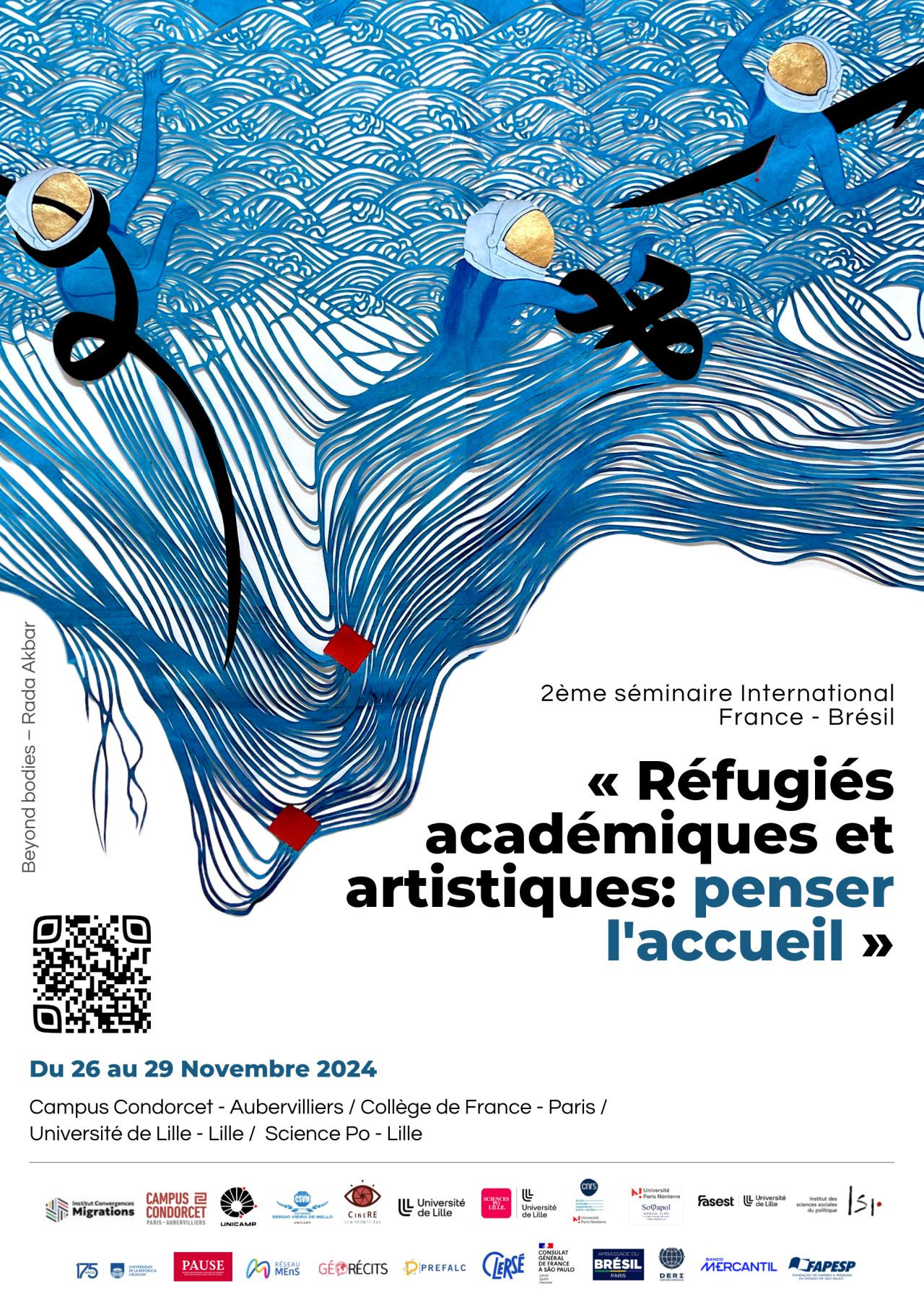Rethinking the Hosting of Academic and Artistic Refugees: Lessons from the Second Franco-Brazilian Seminar
The Franco-Brazilian seminar "Academic and Artistic Refugees: Thinking the Hosting" jointly organized by Campus Condorcet, the Institut Convergences Migrations, the University of Paris Nanterre, the Institute of Political Science, Sophiapol, the University of Lille, Sciences Po Lille, Clersé, the University of Campinas (Brazil), the University of the Republic (Uruguay), and the PAUSE program hosted by the Collège de France, took place from November 26 to 29, 2024 in Aubervilliers, Paris, and Lille, following a first edition in Campinas (Brazil) in 2022.

This event brought together researchers, artists, refugee students, civil society actors, and government representatives around a crucial question: how and why can we better support and integrate individuals forced into exile within the academic and artistic spheres?
Rich in exchanges and testimonies, the seminar highlighted the complexity and uniqueness of these individuals' journeys, as well as the challenges they face in their host countries, both professionally and personally. The conferences, mapping workshops, artistic performances, and testimonies provided a 360-degree view of their realities. Discussions focused on the diversity of exile experiences, the challenges of integration, the role of cultural and academic institutions, and the issues of memory, representation, and the heritage of trajectories and journeys, in an international context marked by the proliferation of conflicts (Ukraine, Sudan, Palestine, etc.) and the rise of populism and xenophobia.
During the session held at the Collège de France on November 28th, participants exchanged ideas on the complex and multidimensional nature of scientific and artistic exile, on the opportunities that hosting such individuals presents, and on the need to develop adapted, coordinated, and sustainable responses.
Indeed, the challenges faced by artists and scientists forced into exile are numerous: rupture with their environment and professional networks, social demotion, difficulties adapting, precariousness, trauma, feelings of guilt or even desertion with respect to their country of origin, invisibility, etc. This loss of bearings and these difficulties often lead to an identity dilemma, between professional identity and "administrative-political" identity: international artists/scientists or exiles? Temporary displaced persons or refugees?
These multiple challenges call for the development of adapted reception mechanisms and the implementation of public policies that take into account their specific needs. They require the mobilization and coordination of all stakeholders involved: public authorities, universities, research organizations, cultural institutions, civil society, diasporas, and, of course, the individuals forced into exile themselves.
Indeed, hosting academic and artistic refugees, beyond being a challenge, is an opportunity for host countries. It allows for mutual enrichment through the contribution of specific skills and unique perspectives, whether they be scientific, artistic, linguistic, or cultural. The concept of academic or artistic "refuge" responds to a humanitarian, scientific, and political challenge and contributes to the international influence of the host country. It is therefore a matter of recognizing the value of these individuals, forced into exile, and providing them with the means to continue their research or creative activities in the host society over the medium or long term.
Such mechanisms already exist and have proven their effectiveness. In France, the French national hosting programme for scientists and artists in exile (PAUSE) has supported 570 scientists and 85 artists since its creation in 2017 and is a key player in the new European pilot funding mechanism for scientists at risk, the SAFE project.
The University in Exile (UXIL), created by the institutions of the Campus Condorcet, contributes to stabilizing these pathways by offering PAUSE laureates the opportunity to propose seminars and to create research chairs by and for scientists at risk in the field of the human and social sciences.
The Migrants in Higher Education (MEnS) network, a collective of French higher education institutions, can also be mentioned. It was formed to welcome and support migrant students in their academic journeys and has, among other things, contributed to the creation of the "Passerelle" diploma.
However, these mechanisms remain fragile, and the question of their sustainability, particularly financial sustainability, is a major challenge. Increasing and diversifying funding sources is crucial to ensuring and continuing the hosting and support of scientists and artists at risk, whose numbers, unfortunately, are constantly increasing.